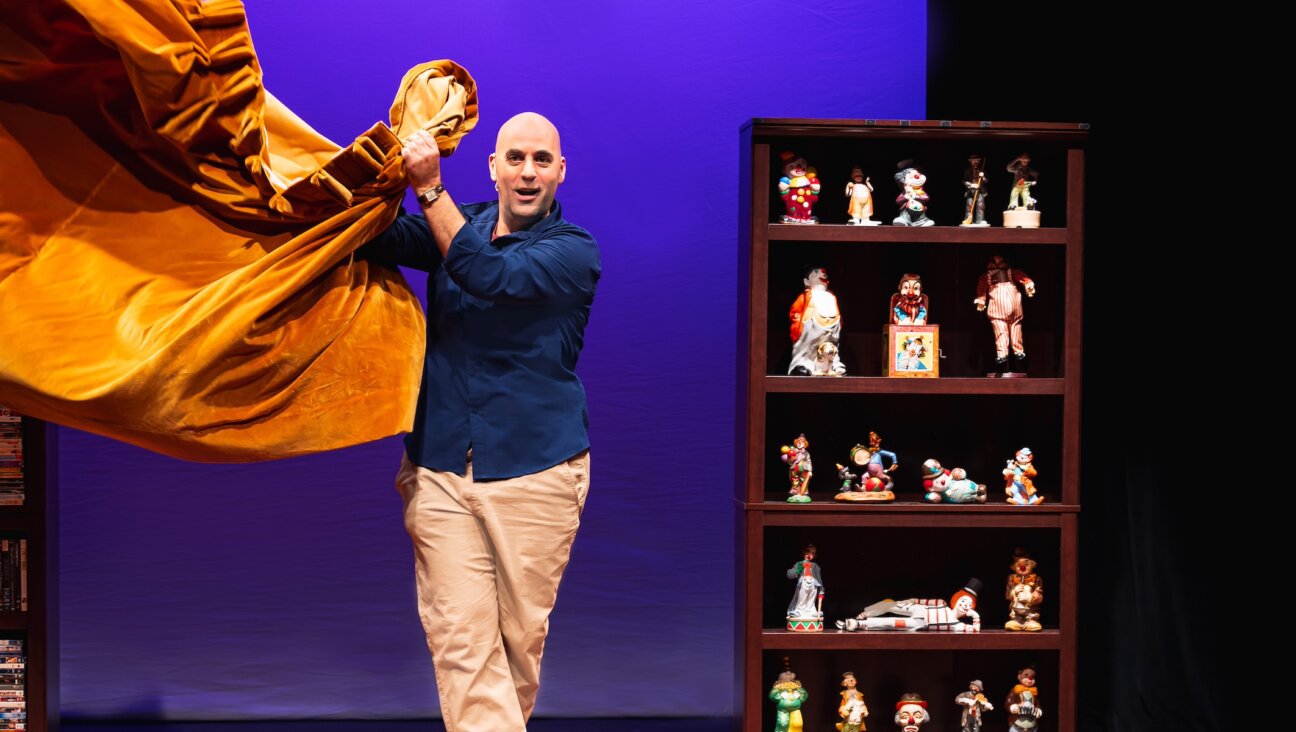Let Simon Rich Convince You God Is Petty

Simon Rich with the cast of “Miracle Workers.” Image by John Sciulli/Getty Images
All you need to know about the new TBS series “Miracle Workers” is that God is played by Steve Buscemi. Yes: Steve Buscemi, probably best known for playing the gangster Nucky Thompson on HBO’s “Boardwalk Empire,” one among a long litany of Buscemi characters who are, well, just a bit off kilter
While Buscemi may seem an unlikely God, he is, in fact the perfect choice for this role. Who else to play a God who, as founder and CEO of Heaven, Inc., is moody, jealous and petulant, a deity who — spoilers! — decides on a whim to obliterate the planet?
Fortunately for earthlings, two angels who work in the Department of Unanswered Prayers, Craig (Daniel Radcliffe) and Eliza (Geraldine Viswanathan), convince the Lord to make a deal. In the improbable event they can get two shy people to fall in love, God will rescind his order.
The seven-episode series is the creation of Simon Rich, 34, who based it on his book “What in God’s Name?” Raised in a Reform Jewish household in New York, Rich was bar mitzvahed at the Central Synagogue. Rich went to Hebrew school from roughly ages eight to 16, a period in which he became entranced by the Torah.
“I found it to be riveting, dramatic, fascinating, absurd and frequently hilarious,” he said in a telephone interview. “I was obsessed with the character of God, who struck me as one of the most incredible characters in all of Western literature.
“He’s just incredibly vulnerable and needy, and at the same time all-powerful [and] decisive. He’s also occasionally irrational and inconsistent. The way He’s written in the King James version, he’s really funny. He has dialogue that you’d see in a Douglas Adams book.”
An example? “The first time He appears to Abraham, Abraham is 99 years old, and the speed with which He brings up circumcision is insane,” Rich said. “He introduces himself first and says, ‘I am the Lord, your God,’ and then immediately asks [Abraham] to circumcise himself and all his servants. That’s a big ask.”
“Miracle Workers” is not the first piece of Rich’s work to focus on the Biblical. There are several references in his stories, including in “The Road Back to Beersheba,” in which Rich imagines a conversation between Abraham and Isaac on the way home from Mount Moriah, where Abraham intended to sacrifice Isaac on God’s instructions, only to have those instructions rescinded at the last moment. In Rich’s version, published in his collection “Ant Farm” (2007) Abraham tries to convince Isaac not to tell his mother, Sarah, what happened.
Clearly Simon has a colorful take on life. (Another of his short stories, in a collection called “Last Girlfriend on Earth” (2013), is narrated by a condom in a teenager’s wallet.) So the question is: Is there some childhood trauma he wants to finally get off his chest? He quickly says no; by his own admission, he’s lived a relatively charmed life.
His father is Frank Rich, the longtime New York Times theater critic and columnist. His stepmother is Alex Witchel, a Times reporter and novelist. At Harvard, Rich was the head of the Harvard Lampoon, the university’s storied humor publication.
In 2008 Rich become the youngest writer then ever hired for “Saturday Night Live.” After a three-year stint there, he became a staff writer at Pixar, where he helped punch up the script for “Inside Out.” He’s had a half-dozen books published, including “Man Seeking Woman,” which became a television series of the same name.
The Guardian called him “Arguably the wittiest American humorist of his generation.” Rich views his work slightly differently. “I see my work as superficially nihilistic and on the surface it seems defeatist,” he said. “But I try to write stories that are ultimately life affirming and hopeful. I usually start from a dark place and push slowly to some kind of redemption.”
He’s concerned that his success has come too easily. “I obviously love it, but I definitely feel guilty occasionally about all the blessings I’ve been given.” He lays it all out in a collection appropriately called “Spoiled Brats.” “[My] story, ‘Sell Out,’ is about that feeling,” Rich said. “I wrote that story out of a sense of guilt.”
“Sell Out,” one of Rich’s most personal works, stars his great-grandfather Herschel, who immigrated from Lithuania in 1912 (true) and got a job in a Brooklyn pickle factory. In “Sell Out,” Rich imagines Herschel falling into a vat of pickle brine, in which he is preserved for 100 years. He emerges unscathed in modern Brooklyn at the age of 27 and tracks down his great-grandson. At first he’s delighted to discover his descendant is a doctor. That turns to disappointment when he realizes Rich is a script doctor, addicted to porn, whose biggest problem is that his internet connection is slow.
Rich believes that like the fictional Herschel, his real great grandfather wouldn’t approve of his first world lifestyle. “He’d be disgusted by it,” Rich said. “Completely horrified. But Seth Rogen approved. He just finished shooting a film version of “Sell Out.”
Buscemi, another fan, overcame initial concerns when he was offered the character of God. “He had some questions,” Rich said. “But I hopped on the phone and explained to him that the role of God was that of an extremely human character, with real vulnerability, flaws, but also certain strengths. He got excited to dive in.”
One thing Buscemi discovered is that this God doesn’t take criticism well. He shows no mercy, for instance, to Bill Maher, the comedian who wrote and starred in the film “Religulous,” which pokes fun at religion, as does Maher’s HBO series “Real Time with Bill Maher.” So, Buscemi’s God decides, Maher has to pay a price: God sends one of his minions down to explode Maher’s penis. (We did note that Buscemi’s God is petulant.)
For the record, Simon did ask permission to blow Maher up. “We did. We just said ‘Would you please not sue us,’ and he said fine.”





















